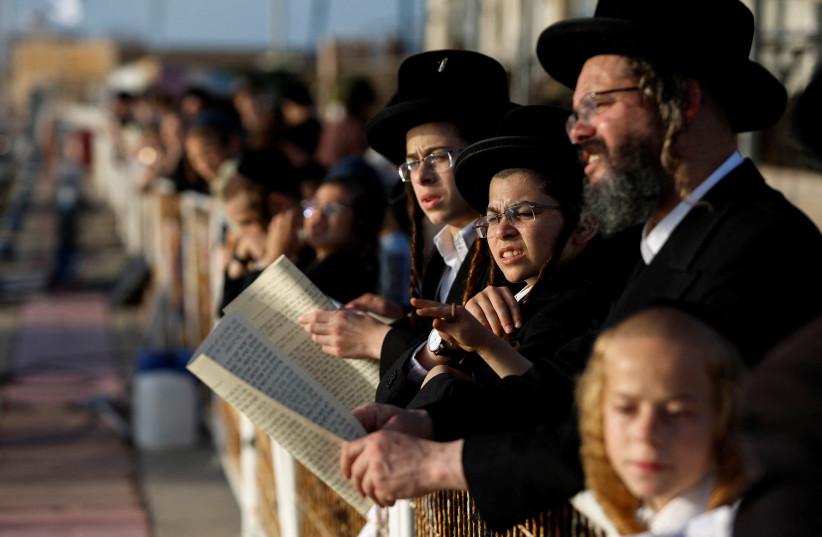Stop the demonization of Israel’s haredim – editorial
Thousands of demonstrators against the judicial overhaul marched through Bnei Brak on Wednesday night, protesting more against the haredim than against the judicial reform.
To a certain degree, this was to be expected. As the judicial reform legislation is paused and negotiations over various proposals take place under President Isaac Herzog’s auspices, some of the passion that fueled the protests is inevitably fading. As a result, a new issue – though tangentially related – is needed to reignite passions and keep momentum alive. And the issue that has emerged is the ultra-Orthodox.
The march took place amid the Knesset budget debate and plans to allocate some NIS 14 billion in special funds for pet projects of the coalition parties, with the lion’s share of that going to the haredi community. Protesters held up signs reading, “Stop taking my money already” and “We are not your mules.”
Even if most of the country’s haredim went into the army and then into the workforce – which is not the case today – some would still be irrationally resentful and antagonistic toward their lifestyle.
But what adds fuel to the fire, and what is even more galling for the non-haredi population, is that while the haredi parties are demanding and receiving billions of shekels, the haredi community, by and large, continues to abstain from military or national service and does not enter the labor force – and thus the pool of tax-paying citizens – in proportion to the size of their community.
Moreover, the haredi parties want to cement this situation by pushing for a new conscription law that will exempt yeshiva students army service at age 22, thereby officially sealing a blatantly unequal arrangement.

After getting state-approved draft exemptions, haredi men should at 22 be able to leave the yeshivot and enter the workforce. But haredi parties are also asking for state funds to educate children in schools that do not teach math and English, basic skills needed to get a decent job.
Resentment of all this is understandable, even among those who well understand the value of Torah study. What is not acceptable, however, is some of the ways this anger is now being channeled.
Resentment grows against haredi community members
Several unfortunate developments took place at Wednesday’s protest.
First, there were some minor physical skirmishes between the protesters and some Bnei Brak residents. Secondly, protesters prevented a journalist from the right-wing Channel 14 from reporting from the scene, blocking his camera with Israeli flags and chanting and whistling to drown him out. One can only imagine the indignation were a journalist from a left-wing outlet prevented from reporting at a haredi or right-wing protest.
Finally, and most outrageously, videos of the demonstration show protesters singing the well-known Hanukkah song, “We Have Come to Banish the Darkness.” Those singing that song in the middle of Bnei Brak are making an ugly statement: “We are the representatives of light, and you – with your antiquated lifestyle and beliefs – represent darkness and need to be enlightened.”
That’s abominable.
While it is legitimate to protest against exaggerated budgetary allocations going to the haredim and it is justifiable to demonstrate against the unequal distribution of the country’s security burden, it is wholly illegitimate and unjustifiable to demonize an entire sector of the population.
Not only is it illegitimate – it is also dangerous. The last thing Israel needs now is to sow further internal division.
This is the second major demonstration in Bnei Brak since the judicial reform protests began in January: the first one passed without incident, but a handful of incidents marred this one. That trajectory should give the organizers pause. They need to consider what further marches in Bnei Brak will bring, whether it is worth it, and what they seek to accomplish, other than to antagonize the city’s residents.
On the other hand, haredi leaders need to look at what their over-the-top demands are causing. While this is all part of the political game, whereby those in power look after their own, there must be some sense of proportion and mutual responsibility. The absence of that sense of common good leads to resentment, frustration and even hatred. And that won’t end well for anyone.





Comments are closed.